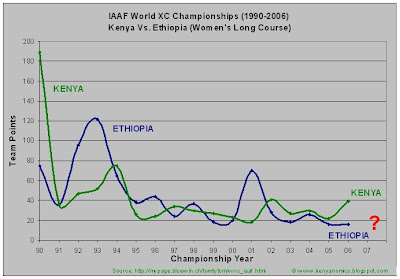 Background
Background
The 2007 Index of Economic Freedom is out. The annual publication of The Wall Street Journal and The Heritage Foundation is an indicator of individuals’ freedom to control their economic affairs. The 2007 report authors refer to economic freedom as the ability of individuals to produce, consume, and distribute goods and services without interference from the state or any other entity. Economic freedom calls on governments to restrain themselves to the provision of entrepreneurial-friendly environments. That includes (1) providing proper legal and law enforcement systems (2) enhancing contract laws and (3) facilitating access to sound money.
How well a government performs the above roles determines a country’s economic freedom, which is measured in percentage points. A country with higher degrees of freedom, say 90%, means that the government is performing its roles efficiently and it rarely interferes with people’s economic endeavors. On the other hand, a country experiencing low degrees of freedom, say 30%, means that the government is spending more time encroaching on individuals’ economic lives other than performing its designated roles. Government interference can happen in 10 indifferent ways.
East Africa
As the above chart shows, Ugandan economy is the most-free in East Africa, a position is has held for thirteen straight years. The Peal of Africa is currently ranked as the fifth most-free economy in Africa and 58th in the world. Mother Kenya is ranked eighth in Africa and 82nd in the world, whereas Tanzania is ranked 15th in Africa and 103 in the world.
Economic freedom is not to be taken lightly; it is directly related to prosperity, thus a better weapon to fight poverty. The report observes that countries experiencing higher degrees of economic freedom were more productive and had better living standards.
That fact holds true for Eastern Africa. Picture this: Uganda, the freest economy in Eastern Africa, has the region’s highest per capita productivity ($1,478), highest life expectancy (48.4 yrs), and the highest education enrollment ratio of 66.1%. Kenya comes second with a per capita productivity of $1,140, life expectancy of 47.5 years, and an education enrollment ratio of 60.1%. Tanzania, which has the region’s lowest economic freedom, lags with a per capita productivity of $674, life expectancy of 45.9 years, and an education enrollment rate of 47.1%. Those three factors (life expectancy, education and productivity) are key components of the United Nation’s quality of life index, popularly referred to as the Human Development Index.
That simple example from Eastern Africa, which is depicted all over the world, should convince our policy makers on the importance of economic freedom in the society. It could be the missing link in the battle against poverty.




